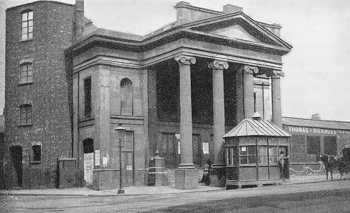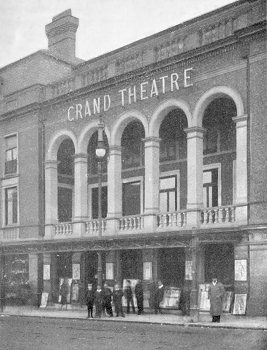Wolverhampton's Old and New Theatres The Play's The Thing The first building used for the production of stage plays in Wolverhampton was the ancient Town Hall, which up to the year 1779 occupied a site in the centre of the old Market Place, now called Queen Square. After the old Town Hall was pulled down a new and more commodious theatre was erected at the extreme end of the yard at the back of the old Swan Hotel, bounded by King Street on one side, and separated only by the narrow passage known as Wheeler's Fold, from the Noah's Ark Chapel in Lichfield Street, and in which Wesley preached during some of his visits to Wolverhampton. The building was a plain but substantial brick structure, and the interior of the theatre was almost as plain as the exterior, the seating accommodation providing for an audience of about 700. Small as the place was, yet at the time of the erection it was considered a good-sized edifice for Wolverhampton, with its then population of less than 12,000. Amongst those who delighted audiences at the old theatre in Swan Yard may be mentioned the well known Mrs. Siddens, and her equally talented brother, John Philip Kemble; the celebrated comedians, Mr. Emery and Mr. W. Farren; the "Young Roscius" (Master Betty), Charles Matthews the elder, Charles Kemble, the two Keans (father and son), the great Macready, Mr. Chippendale, and the long popular Madame Vestris. The first manager of the theatre of which there is any record was a Mr. Crisp, who held that position from about the year 1809 to 1820, and he was succeeded by a Mr. Shuter, but at the end of two years he also retired, and the place was closed. In 1823 it was re-opened by Mr. Bennett (conjointly with Mrs. Beahan), and this year the theatre was first lighted with gas. Mr. Bennett made himself popular with theatre-goers, and during the seventeen years he continued to hold the post of manager, he enjoyed on the whole a fair run of good luck. An old playbill in the possession of Mr. Wm. Lowe Fleeming, Queen Square, dated November 12th, 1830, records a benefit for Mr. Young, at that time a celebrated tragedian. The play presented was Macklin's comedy, "The Man of the World," Mr. Young taking the leading character; concluding with the farce, "The Blue Devils." Prices for admission were:- Boxes, 3/-; pit, 2/-; gallery, 1/-; with a concluding notice that "nothing under FULL PRICES. can possibly be taken to any part of the house." About the year 1840 a general desire was expressed for the erection of a new building of a more commodious character, and on a more suitable site, and in the month of September, 1841, a meeting was held at the Pack Horse, Dudley Street, for the purpose of promoting a company for that purpose. The capital to be subscribed was fixed at £3,000, in £1 shares, and in order to interest the public in the movement, an amateur dramatic entertainment was given in the old theatre, the use of which was lent for the occasion by the veteran lessee and manager, Mr. Bennett, this being the last theatrical performance given in the "old theatre in the Swan Yard." The foundation stone of the "Theatre Royal," in Cleveland Road, was laid in the month of June, 1844, and the opening ceremony took place on Easter Monday, 1845, under the lesseeship of Mr. James Munro, with Mr. James Bennett, a good Shakespearean actor in those days, as manager. The builder was Mr. Robinson, who then carried on business in Castle Street, and amongst those who took a leading part in carrying out the scheme were Sir Rupert Kettle, Henry Walker, F. Walton, C. Sparrow, Geo. Wynn, R. S. Walker, Brotherton, Merrick, and Tichborne.
But whatever the hopes and anticipations of the original promoters of the Theatre Royal may have been, as to the success of their venture in the future, they were early doomed to disappointment, for in little more than twelve months after the opening, the season had to be brought to a premature termination, and the lessee (Mr. Munro), in a brief address to a thinly-attended house, expressed "the disappointment he had experienced that the efforts he put forth to cater for the theatrical tastes of the town had been so scantily appreciated, with the result that the last season had been the most disastrous he had ever had to encounter in the whole of his long experience as a theatrical manager." But better days Were in store. Mr. Henry Hayward, member of a well-known local musical family, took on the theatre for a time for the purpose. of giving a series of first class concerts, but the speculation was barely profitable, and again the theatre was closed, to be re-opened in the August race week of 1847 by Messrs. Charles Dillon (the great tragedian) and Henry Widdicombe (comedian). The bill of fare was a varied one, and partook more of the melodramatic style than that of high-class pieces. Messrs. Dillon and Widdicombe succeeded in meeting the popular taste, and it was under their management that the great Macready visited the town "for one night only," delighting the lovers of Shakespeare with his masterly impersonation of "Othello," with Mr. Charles Dillon as "Iago," and Mrs. Dillon in the character of "Desdemona." Mr. Dillon also played "Iago" to the "Othello" of the eminent tragedian, Gustavus Vaughan Brooke, who first visited Wolverhampton in May, 1848. It will be remembered by a few that the great actor was a passenger on board the ill-fated steamship "London," which went down in mid-ocean with nearly the whole complement of souls on board, including Mr. Brooks. Mr. and Mrs. Charles Kean made their first and only appearance at the Wolverhampton Theatre in 1848, in the "Wife's Secret" and "Paul Pry." On the retirement of Messrs. Dillon and Widdicombe from the lesseeship, the theatre was taken in hand by different managers, with varied successes. One manager, Mr. Henry Powell, crippled for want of funds, tried the desperate expedient of lowering the prices, and to a 3d. gallery and a 6d. pit, produced for each night's performance the following: THE LAST ACT OF "RICHARD III. followed by THE HEADLESS HORSEMAN and concluding with DRED; OR THE DISMAL SWAMP But the audiences became more attenuated every week, and the band striking for arrears of pay, accompanied with threats from the Gas Company to cut off the supply, the manager threw up the sponge, and the theatre was again closed. In 1870, Mr. Brewster, lessee of the then Prince of Wales's Concert Hall, took the Royal in hand, and thoroughly renovated and re-decorated the house, Mr. H. C. Hazlewood acting as manager. But playing one house against another was not a great success, and in 1877 Mr. Brewster retired from the lesseeship of the Royal, and it passed for a short time under the management of a Mr. Birrell. But in 1878 the old house was once more shut up, and the building was put up in the market for sale. Eventually a number of gentlemen formed themselves into a joint stock company, and were successful in raising sufficient funds for purchasing the building, the result being that on the night of the 5th August, 1878, the place was re-opened under the most gratifying auspices and with every promise of a successful career, the late Lady Wrottesley occupying the place of place of honour in the dress circle, surrounded by a numerous and well-dressed assemblage of ladies and, gentlemen of the town and neighbourhood. As is well known, our new Free Library now occupies the site of the old Theatre Royal, consequently the prophetic tone of the writer in the "Wolverhampton Chronicle," of December 12th, 1894, is of interest. Concluding a series of interesting articles on matters theatrical in Wolverhampton, he says "Those who were present in the theatre on Saturday night, when the curtain was rung down for the last time, must have felt a pang of regret that a house in which they have spent so many enjoyable hours, will henceforth pass away to other, and perhaps baser and less elevating, uses." The new Grand Theatre, in Lichfield Street, was opened on December 10th, 1894.
Under the capable management of Mr. Percy Percival, the Grand Theatre is enjoying a most successful career. Mr. Percival came to Wolverhampton in June, 1901, and it has always been his aim to put upon the stage the higher class plays of the most celebrated writers, and of seizing every opportunity that presents itself of securing for their exposition the leading actors and actresses of the day, with all the accessories of good scenery and other stage effects. By these and other means he has made himself exceedingly popular, and that success will continue to crown his efforts is the hearty wish of every lover of the drama. Bookings. since Mr. Percy Percival has managed the theatre have included the following:- Sir Henry Irving, Mr. and Mrs. Kendal, Miss Julia Neilson and Mr. Fred Terry, Mr. Edward Compton, Miss Fortescue, Miss Florence St. John, Mr. Beerbohm Tree's companies, Mr. George Edwardes' companies, Mr. George Dance's companies, Mr. Charles Frohman's companies, Mr. Frank Curzon's companies, Frederick Mouillot's companies, Mr. Milton Bode's companies, Mr. Henry Dundas's companies, Royal Carl Rosa - Opera company, Mr. F. R. Benson's Shakespearean repertoire company, D'Oyly Carte's opera companies, Mr. Tom Davis's companies. All the latest London successes are presented at the earliest possible date. The Grand Theatre is unique for the size of its stage; the greatest productions can be staged with ease. The proscenium is fitted with a patent fire-resisting curtain, forming an effective fire-proof division between the stage and the auditorium. The curtain is constructed of wrought-iron framing, which is fitted with double plates of the best quality asbestos, the total thickness of the curtain being 4.25in. A strong brick wall has been built from the basement to the stage level, on which the curtain rests when down, and this, with the proscenium wall (which is carried up some eight feet above the roof line) forms a perfectly fire-proof division. The exits are numerous, and easy of access, and the theatre can be emptied in a remarkably short space of time. At the general meeting of the shareholders of the Wolverhampton New Theatre Company, Ltd., held at Wolverhampton, on Thursday, March 2nd, it was agreed to declare a dividend of 5 per cent. less income tax. A vote of thanks was accorded to Mr. T. J. Barnett (secretary), who, in reply, said the result showed that the company had a sound commercial property. Mr. H. Percy Smith was appointed auditor. |





